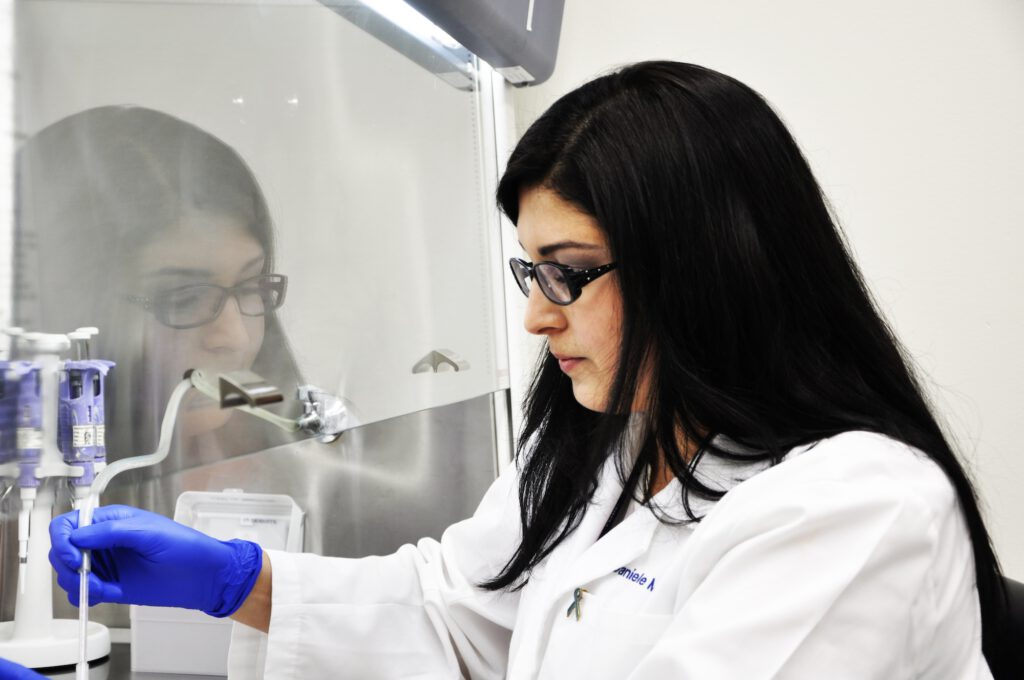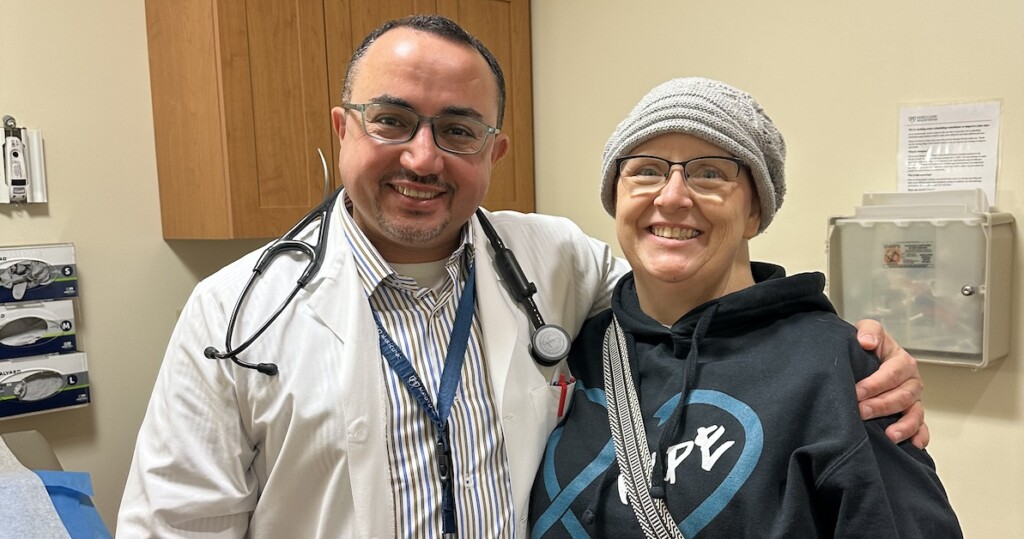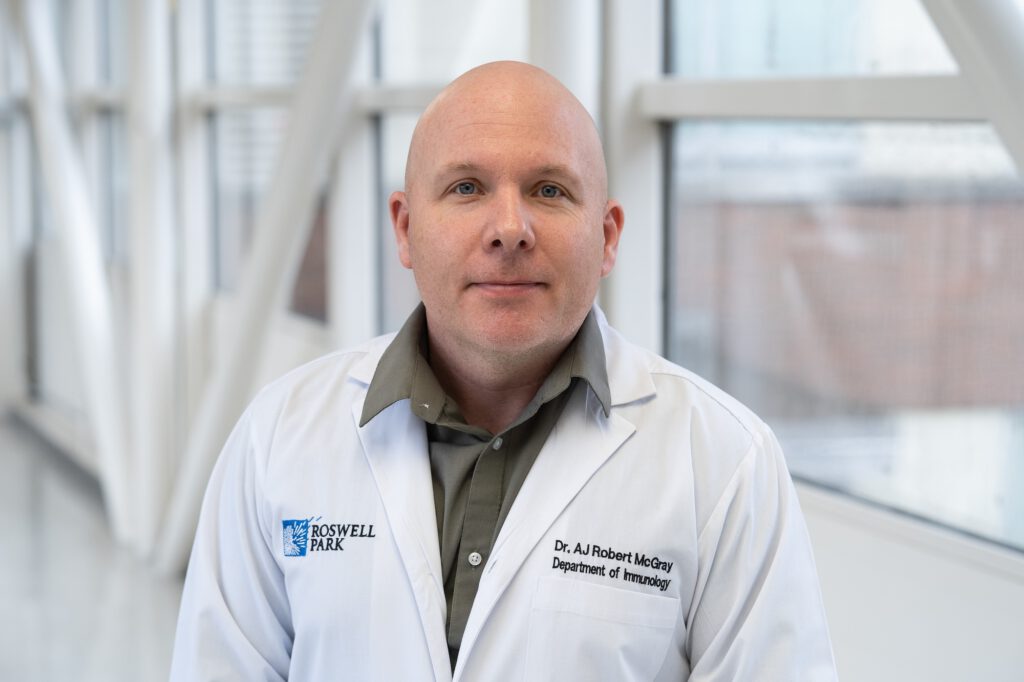
About Clinical Trials
Explore new treatments for ovarian and gynecologic cancers.
Until we find a cure, prevention is our greatest weapon. Understanding your risk and taking preventive measures is crucial in the fight against ovarian cancer. Learn about the factors that contribute to ovarian cancer risk and explore prevention strategies to reduce your risk.

OCRA is proud to be in the forefront of promoting new recommendations in the fight against ovarian and related gynecologic cancers.
With no early detection test — and important research demonstrating that in most cases, detecting ovarian cancer even 18-24 months earlier, well before symptoms begin, does not improve mortality — we are focusing on strategies that DO work and can save lives.
To support these recommendations, OCRA offers free genetic testing for those at increased risk, and advocates for consideration of prophylactic surgery at the time of other planned pelvic surgery even for those at average risk, to potentially prevent the deadly disease.
Taking proactive steps can significantly reduce your risk of developing ovarian cancer. Here are some strategies that have been shown to lower the risk.

Identifying risk factors is key to understanding your personal risk of developing ovarian cancer. Many factors can increase or decrease the risk, and knowing these can guide you in taking preventive actions. Talk to your doctor if you are concerned about your risk of developing ovarian cancer.
The five-year ovarian cancer survival rate for white women is 50.6%; in Black patients, it’s 43.2%. A similar pattern exists within cervical and uterine cancers. To learn more about health inequities, and how you can get involved in fighting them, go to the bottom of this page.

As noted above, startling health inequities exist in gynecological cancer survival rates. For example, the five-year ovarian cancer survival rate for white women is 50.6%; in Black patients, it’s 43.2%, according to the Surveillance, Epidemiology and End Results (SEER) Program of the National Cancer Institute: 5-Year Survival Rates, as of August 2024.
It is critical that these health inequities be changed from both a moral and economic standpoint. The video session, “Inequities in Ovarian Cancer Care: A focus on Black Women,” presented by Dr. Dineo Khabele, Washington University, at OCRA’s annual conference, addresses health inequity from a historical, medical, social, moral, and ethical standpoint, while offering critical insights on why change must occur, how doing so will lead to better care for all of us, and how we can all get involved.
To learn more about racial disparities in ovarian cancer and how to overcome racial disparities in genetic testing, please read the linked articles.
For more information about Black women and other gynecological cancers such as endometrial cancer, read Cancer Facts & Figures 2024. For example, pages 30-31 show that the five-year relative survival rate for uterine corpus cancer is 84% for white women but only 63% for Black women, one of the largest racial disparities in cancer. This is partly because Black women are much less likely to be diagnosed with localized-stage disease (56% versus 72%), although survival is lower for Black women for every stage.
In fact, in a recent article, Dr. Carol Brown explains that “the incidence of endometrial cancer — and the death rate — are rising almost one and a half times more quickly in Black women than white women.” Read more in the article Endometrial Cancer: New Insights Into a Deadly Disparity | Memorial Sloan Kettering Cancer Center (mskcc.org).
An excellent resource for information about this topic is Endometrial Cancer Action Network for African-Americans | ECANA (ecanawomen.org)
In a new series from BlackDoctor.org and OCRA, members of OCRA’s community share their experiences as Black women navigating diagnosis and treatment, the healthcare system, and more. In this final installment, Tracy Moore, LCSW, OCRA’s Vice President, Support and Education, talks about the many programs and resources Ovarian Cancer Research Alliance has available for the ovarian cancer and gynecologic cancer community.
Because there is no reliable screening test for ovarian cancer, understanding genetic risk factors is crucial for prevention. Genetic testing can identify inherited mutations that increase the risk of ovarian and other cancers. This information can help individuals and their families take proactive steps to manage their risk.
Download our infographic about genetic testing and biomarkers.
Genetic testing involves a simple blood or saliva test to detect gene changes passed down from parents. Consider testing if you have:
We know so much more now than we did decades ago, when genetic testing first became possible. For instance, we now know that the most common and lethal type of ovarian cancer actually begins in the fallopian tubes. So if someone found out that they have a genetic mutation that puts them at an increased risk for ovarian cancer, they can discuss with their doctor actions they can take to prevent it – whether that be oral contraception (which has shown to reduce risk for both ovarian and endometrial/uterine cancer) or prophylactic surgery (removing the fallopian tubes and/or ovaries).
OCRA has spearheaded the promotion of new recommendations in the fight against ovarian and related gynecologic cancers by advocating for consideration of prophylactic surgery at the time of other planned pelvic surgery even for those at average risk, to potentially prevent the deadly disease. No one has to live in fear of the unknown, because today there are safe and effective actions that someone can take.
Cascade testing is a process that begins with one person’s cancer diagnosis. If a harmful mutation is found, close relatives can be tested for the same mutation. This process can identify others at risk within the family, allowing for preventive measures. Cascade testing is often covered by insurance.
Biomarker testing goes beyond genetic testing to include analysis of blood or tissue for tumor markers and mutations. It can also assess non-hereditary factors like tumor protein expression. This information is essential for risk assessment and determining the most effective treatment plans.

Genetic counseling helps you understand your risk of ovarian and related cancers by assessing your personal and family cancer history, as well as your heritage. This information is crucial in deciding whether to pursue genetic testing.
Despite the recommendations for both those at increased risk of ovarian cancer and those who have already been diagnosed, there can still be a lot of confusion around genetic testing. Read on for answers to the most commonly asked questions.
Genetic testing can be done via a cheek swab, spit sample, or blood draw. This sample is then sent to a lab that screens for a panel of mutations associated with increased risk for a variety of cancers. It usually takes a few weeks to get results. Many testing services have genetic counselors on staff who can answer any questions and discuss results and possible next steps.
Anyone – male, female, or non-binary – who has a family history of certain inherited cancers, such as breast, ovarian, uterine, or colorectal, are encouraged to get genetic testing. It is important to note that genetic mutations can be inherited from both the mother and the father. Therefore, it is possible for a man to have and pass down a genetic mutation that could put his offspring at risk for ovarian or other gynecologic cancers. In addition, those who have been diagnosed with ovarian or other gynecologic cancers should have genetic testing as well, because the knowledge of a mutation – whether inherited or in the tumor itself – may impact the type of treatment the medical team will suggest.
Men, and those born male, need to be aware of their family history as well, not only for their own increased risk of non-gynecologic cancers, but also because they can pass genetic mutations to their offspring. So a father who has a genetic mutation can pass it on to his daughter, which may put her at increased risk for ovarian or other related cancers, or could pass it to his son, which could increase his risk for other related cancers.
The genetic testing that NCCN (National Comprehensive Cancer Network) guidelines recommend looks at a person’s genome and screens for a panel of possible genetic mutations that can lead to an increased risk of ovarian and other gynecologic cancers. It is not the same type of genetic test used to determine one’s ancestry.
There are many terms you may hear when learning about genetic testing, including germline, somatic, and genomic. Ultimately, they all fall under the umbrella of genetic testing, but there are slight variations.
Knowledge is power, and genetic testing is an important way to empower yourself with potentially life-saving information. That said, genetic testing can have emotional implications that are important to consider. If someone finds out they carry a genetic mutation, they may feel as if they are destined to get cancer, even if they never ultimately never do. On the flip side, a negative result may produce a false sense of security. Someone without genetic mutations can still get cancer. It just means they are at average risk for the disease. Sometimes, the results of genetic testing can cause family tension, especially if some members get positive results while others are negative for a mutation. But it’s important that family members are aware of their genetic history. There are resources that can help in sharing information with your family.
Having a genetic mutation does not mean that you will get cancer. But it does place you at a higher risk for a particular cancer or set of cancers, depending on the mutation. Someone with a genetic mutation that places them at higher risk may never develop the disease. And someone who has no known genetic mutations may still one day get diagnosed with cancer. But if you do know that you have a genetic mutation that places you at higher risk, you can discuss this with your doctor. You may get additional screenings, depending on the kind of cancer, or choose to adopt some lifestyle changes. And in the case of ovarian cancer, you may choose to take prophylactic actions, such as removing your fallopian tubes, or if past menopause and childbearing, a bilateral salpingo-oophorectomy (removal of both ovaries and the fallopian tubes), that could greatly reduce your risk.
For those who have been diagnosed with ovarian or other gynecologic cancers, NCCN (National Comprehensive Cancer Network) guidelines recommend germline testing (which looks for inherited mutations) and somatic testing (which looks at the DNA in the tumor itself). Knowing if someone carries an inherited genetic mutation can help family members of the patient take actions if inherited mutations are found so that they can prevent developing the disease in the first place. Furthermore, knowing whether there are any genetic mutations – either inherited or in the tumor – will help guide the patient and medical team to the best treatment options.
Genetic counseling is when a medical professional, such as a genetic counselor, asks questions about your personal and family history with cancer, as well as questions about your heritage. The reason they ask about heritage is that some ethnicities and backgrounds, such as Ashkenazi Jews, have a higher incidence of certain genetic mutations. The genetic counselor uses this information to help determine if you may be at increased risk for ovarian or other related cancers, and may then recommend you undergo genetic testing. They will also provide guidance and counsel after you get your results. The National Society of Genetic Counselors can help you find a genetic counselor.
It is not necessary to consult with a genetic counselor prior to testing, but it can be useful to help decide if testing is right for you. You should always speak to a genetic counselor after completing genetic testing if a mutation is present.
Costs for genetic testing may vary, but companies like Color Health offer Hereditary Cancer Tests for $250. Many insurance carriers will cover the cost for these tests (or tests done through your doctor’s office) if you have a family history of certain cancers. It is best to speak with your insurance carrier directly to determine exact coverage.
According to American Society of Clinical Oncology (ASCO), a federal law known as the Genetic Information Nondiscrimination Act, or GINA, prohibits employers and health insurers from using genetic information, including your family history and genetic test results, to discriminate against you. However, current federal laws don’t prohibit the use of family history or genetic test results by life, long-term care, or disability insurers. A genetic counselor can provide more information about GINA.

Knowledge is power. Genetic testing can lower your risk of ovarian and gynecologic cancers.

Explore new treatments for ovarian and gynecologic cancers.

Locate gynecologic oncologists, specialists, and treatment centers in your area.

Recognizing the interconnectedness of ovarian and all gynecologic cancers, OCRA expanded its scope in order to accelerate research and broaden our impact on patients’ lives.
Get email updates about research news, action alerts, and ways to join the fight.